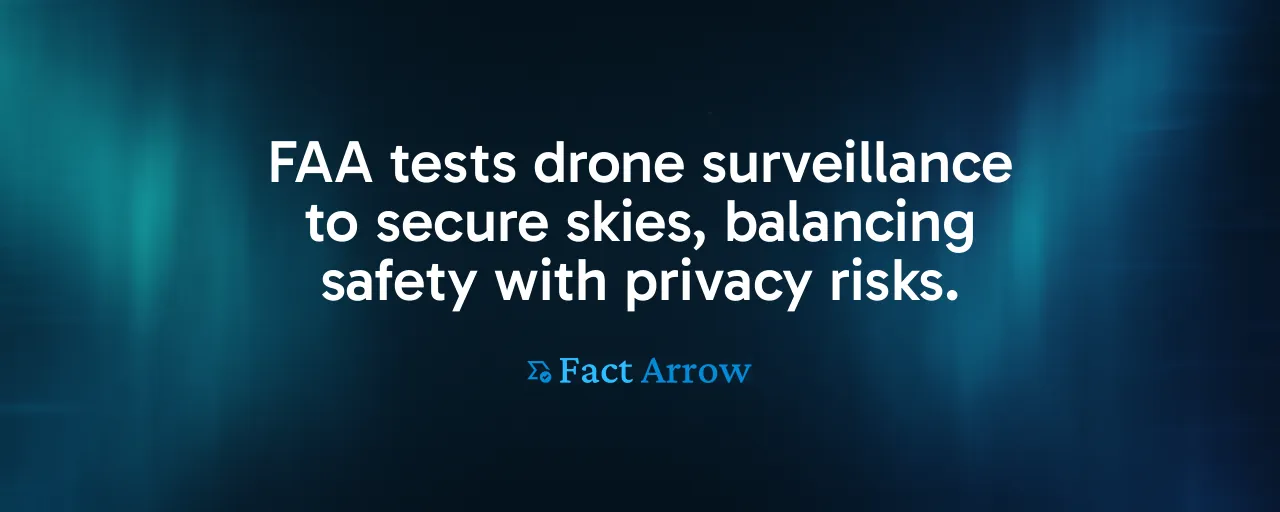A Desert Experiment With High Stakes
In the arid expanse near Santa Teresa, New Mexico, drones will fill the sky from June 16 to 27. The Federal Aviation Administration is testing detection technologies, deploying over 100 drones in a bid to secure America's airspace. Following trials in Alaska and New Jersey, this effort responds to a growing problem: unauthorized drones buzzing too close to planes, prisons, and military bases. But as the FAA sharpens its tools, a pressing question emerges. How do we safeguard our skies without eroding our privacy?
The numbers paint a stark picture. The FAA logs over 100 drone sightings near airports each month, with 411 illegal incursions in the first quarter of 2025, a 25.6 percent jump from 2024. These incidents include a multirotor drone passing 20 feet from a jet's wing at 3,300 feet, alongside similar scares in Houston and Phoenix. The threats, from collisions to contraband smuggling, demand action.
Yet action carries risks. Detection systems powerful enough to spot rogue drones could easily track lawful ones, or worse, monitor people on the ground. Civil liberties groups, including the ACLU and the Electronic Frontier Foundation, warn that pairing these systems with mandatory Remote ID transponders risks creating a surveillance network. The potential for abuse, especially against marginalized communities, is real and troubling.
I care deeply about safe skies, but I'm equally committed to protecting our freedoms. The FAA's tests are necessary, and they require ironclad safeguards to prevent overreach. Why should we accept security measures that could undermine the very rights we cherish?
With more tests slated for North Dakota and Mississippi, the time to act is now. The FAA needs to weave privacy protections into its work, ensuring that safety doesn't come at the cost of our constitutional principles.
Balancing Danger and Democracy
The dangers of rogue drones are undeniable. Beyond near-misses with aircraft, drones have disrupted sporting events, smuggled weapons into prisons, and even hampered police operations. In March 2025, a drone flew perilously close to a commercial jet, one of many incidents that justify the FAA's focus on detection technologies.
However, the call for aggressive countermeasures, like expanded no-fly zones or high-tech jammers, raises red flags. Such tools, often backed by officials prioritizing security above all else, could be misused. Without clear guidelines, authorities might target legitimate drone operators, such as journalists documenting public events, or collect sweeping data on innocent citizens. The FAA's 2023 Aviation Rulemaking Committee offered 46 technical recommendations, but privacy protections were barely addressed.
Civil liberties advocates have a point. A May 2025 statement by the ACLU, EFF, and others urged Congress to impose strict data limits, public transparency, and safeguards for free speech. They cite past abuses, like warrantless surveillance programs, to show how security measures can erode trust. The argument that safety outweighs privacy concerns holds some merit, yet it collapses under closer examination. Trading fundamental rights for security creates a fragile democracy.
The FAA needs to prioritize privacy alongside safety. Detection systems are designed to target only unauthorized drones, with robust oversight to prevent mission creep. Anything less risks turning a safety tool into a surveillance machine.
Crafting a Responsible Path
What does a balanced approach look like? First, the FAA needs enforceable privacy standards. Detection systems require a narrow focus on threats, with mandatory data deletion and warrant requirements to prevent abuse. Public audits would ensure accountability. Why should anyone fear their lawful drone use could land them in a government database?
Second, community engagement is essential. The New Mexico tests involve local first responders, which is promising. But residents near test sites deserve clear communication about how their airspace is being used. Transparency builds trust, and trust is non-negotiable.
Finally, Congress needs to step up. The 2024 FAA Reauthorization Act toughened penalties for rogue drones, but it fell short on oversight. Lawmakers need to mandate independent reviews of counter-drone programs and prohibit their use against protected activities, like protests. These measures would align security with democratic values, proving that safety and freedom can coexist.
Our Skies, Our Values
The drones over New Mexico represent a technical challenge, and they also test our commitment to freedom. The FAA's work is crucial, but it needs to reflect our values of accountability and fairness. We can secure our airspace without sacrificing what makes America unique.
As citizens, we have power. We can demand policies that protect both our safety and our rights. We can hold lawmakers accountable to ensure drone detection serves the public and operates with appropriate checks on authority. The skies above Santa Teresa are a starting point for this vital conversation.
Let's shape a future where our airspace is safe and our freedoms are secure. The balance is possible, but only if we act with urgency and clarity.
